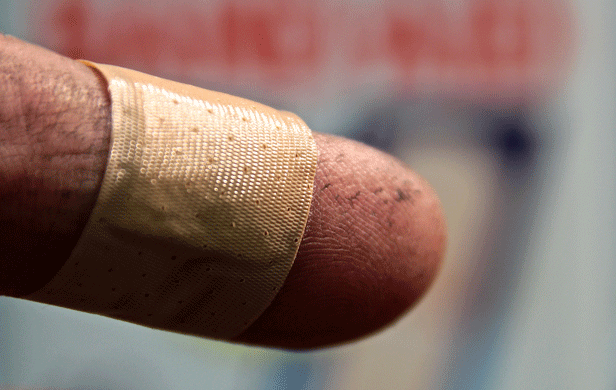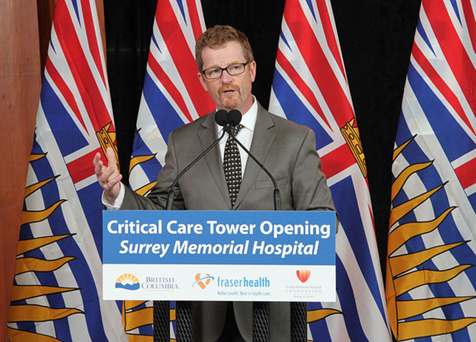
Well, we’ve let it go a very long time – perhaps for so long that a better brand of chaos is all we can hope for with reform. I’m talking about our health care system in this country.
In its most recent global rankings, the World Health Organization had us at number 30 in the world as a health care system. Admitting all of the failings of statistics, it still seems only yesterday we were boasting that we had the best. What is more troublesome is that no matter what number we are, the system is lousy. We are a hell of a long way from “Free medicare” or “socialized healthcare”.
False advertising
Blame is very easy and there’s no shortage of culprits never forgetting Pogo’s “we have met the enemy and he is us”.
It may be that by procrastinating for so long, we have presented ourselves with a problem which is all but insoluble.
The term “health care” is almost impossible to define in any way that makes sense factually or fiscally. Start with a pretty basic deficiency in our system – dental care. No one in their their right mind would allege that care of the teeth is not a very important health issue. We don’t cover it, the UK does.
From there, the irrationalities move into ever-widening circles. I have received enormous relief over the years from my chiropractor and I hate to think of what life would have been like without his help. But, I must pay a large portion of my treatment. Everyone reading this can think of some important, nigh unto critical, medical cost that they must pay for personally. Even an emergency vehicle to hospital.
As if this weren’t enough, the constitutional jurisdiction for healthcare is provincial, but because smaller provinces can’t afford it, power of the federal purse has brought Ottawa in. Thus, the essential decisions are made by the federal government after “consultation” with the 10 provinces over coverage, while the provinces (mostly) administer the care. If you’ve read this far you will see more confusion right around the corner and you are right to do so.
BC’s double whammy

British Columbia is the retirement province for most of the west of the country and much of the rest, thus has substantially higher geriatric costs. Because it’s also a young, growing province it has a double problem.
I well remember, as minister, raising this with the federal minister of the day and pointing out that this not being considered in fiscal transfer was simply unfair. She replied blankly that she couldn’t give one province more money than another, especially a rich one!
Prescription for trouble
One of the huge changes since my time has been in the field of pharmaceuticals and scientific development.
Not long ago, pharmaceutical cost was the occasional prescription from the doctor and the cost, while annoying, wasn’t overbearing. Now, as a senior citizen, my pharmaceutical pills, despite private insurance, are staggering. Uncovered pharmaceutical costs have overtaken doctor costs, which are high in themselves.
Rationing care

In 1979, when I became minister, the CAT scan had just arrived – an enormously important diagnostic tool which every hospital, big and small, wanted. The problem was they cost $1 million each and the province simply did not have enough money to immediately outfit everyone, meaning a form of rationing, and hospitals down the list weren’t happy campers.
Soon, private citizens began to raise the money privately for their favourite hospital. You can quickly see, I’m sure, two big problems: not only did that upset the system, it also raised the nasty question, “Who will pay to run these new machines, which have not been accounted for in the provincial budget?” What seemed to be such a wonderful example of civic generosity, became a societal and a fiscal nightmare.
I remember giving a talk to the staff at Royal Inland Hospital, in my constituency of Kamloops, and during the question period, a nurse said emphatically “Minister you can’t put a price on a human life!”
My response was “in fact, we do that every hour of the day in terms of where we place our funds on behalf of the citizens. It’s how, when and where we place those funds that often determines who lives and who doesn’t.”
Tough choices
Obviously, we must re-examine our health care system in Canada. That’s the easy decision. Now, how the hell do we do it and what are the basic ground rules? How do we deal with the matter of jurisdictions and who is responsible for raising how much of the needed funds; then, of course, who is responsible for the rules for its distribution?
Until we decide on a definition of medical care, what will be covered and what will not, we’re at sea. And it’s critical that we find a mechanism for dealing with change – and then we must decide how much we’re prepared to spend.

I am not going to pretend that a short time as health minister in one province has conferred even the slightest degree of medical wisdom upon me. What I can say is that almost everyone involved in the system thinks “they know”, to the exclusion of all else, where and what kind of medical wisdom is required. These are very sincere people but consider this – I was at a conference many years ago and listened to a heated argument between two health experts on the use of tobacco. One spoke of the obvious drawbacks we all know about and the cost to society, while the other was saying the more people that smoke the less the geriatric cost would be – it’s cheaper on the system when people die young and, therefore, people should be encouraged to smoke! There was a little tongue in cheek involved I suspect.
Now, this is not the centrepiece of the health debate but I just mention it to demonstrate that there are very few issues where everyone agrees.
Clearly, we must start afresh in our discussions and re-visit the essential decisions upon which we base all expenses. Critically, we must develop a protocol for changing those decisions when the need arises. Our inability to adapt has created the enormous distortions we must now try to rectify or it will just get worse and worse.
In this case, the devil may not be in the details but in coming up with a vehicle within which to determine what those details are.
WORLD HEALTH ORGANIZATION – Country Ranking / (Per Capita Expenditure)
1 France (4)
2 Italy (11)
3 San Marino (21)
4 Andorra (23)
5 Malta (37)
6 Singapore (38)
7 Spain (29)
8 Oman (62)
9 Austria (6)
10 Japan (13)
11 Norway (16)
12 Portugal (27)
13 Monaco (12)
14 Greece (30)
15 Finland (18)
16 Luxembourg (5)
17 Netherlands (9)
18 United Kingdom (26)
19 Republic of Ireland Ireland (25)
20 Switzerland (2)
21 Belgium (15)
22 Colombia (49)
23 Sweden (7)
24 Cyprus (39)
25 Germany (3)
26 Saudi Arabia (63)
27 United Arab Emirates (35)
28 Israel (19)
29 Morocco (99)
30 Canada (10)
31 United States (1)
32 Australia (17)


This is apparently the same WHO ranking that people have been misinterpreting since 2000 when the report was released. So far as I know the WHO has not attempted a similar ranking of countries since then.
As is clear if you actually read the accompanying report (particularly Chapter 2 which explains the basis for the various rankings), “overall health system performance” was not an absolute ranking of the quality of health care systems, it was a relative efficiency measure that related attainment to resources. It measured the gap between each health care system’s actual attainment and the maximum attanment that should be possible for that particular health care system, given the same resources. Canada’s 30th place rank in efficiency doesn’t mean that Canada only has the 30th best health care system in the world. Leaving aside the various methodlological criticisms aimed at the WHO measures at the time, for what it’s worth, Canada ranked 7th in overall attainment of health system goals.
Strange as it may seem, it appears that Canada’s lower efficiency rank was largely attributable to our comparatively high education levels. In addition to health care spending, the WHO included average years of adult schooling in the input side of the efficiency equation, as a “proxy” for various determinants of health outside the health care system. Canada’s average years of adult schooling are among the highest in the world; significantly higher than in France and also hgher than most of the wealthy countries that outranked Canada in performance, despite comparable or lower attainment rankings and comparable or higher health care spending.
Our system may need improving, but the WHO rankings (even if you accept them at face value) don’t mean what they have been widely assumed to mean.
“Canada’s average years of adult schooling are among the highest in the world; significantly higher than in France and also hgher than most of the wealthy countries that outranked Canada in performance,”
*****************************************************************************************
Well. That being said.
My personal experience has been that some of the most brainless, clueless, useless people in the workplace or in the neighbourhood were….the most educated.
As far as the WHO tossing that “educated” stat into the mix before determining the ranking of a country on a world wide efficiency rating.
Perhaps they assumed that “educated” people were “smart” and lived “healthy” lifestyles?
Unfortunately our “stellar” obesity rankings( only the US and Mexico are higher than us) would have brought that delusional fantasy back down to earth in a diabetes clinic.
I have several relatives much younger and much much fatter than I who see nothing wrong with injecting insulin twice a day into their stomachs and then eating a meal that would support 5 Syrian refugees for a week.
Who pays for that arrogant, ignorant, stupidity?
ALL OF US
But we’ll try and blame the Cola companies and sue McDonalds because ” the 5 hamburgers I ate and washed down with a half gallon of pop in one sitting were bad for me”
Give….. me….. a…… break.
And its only getting worse as the population gets fatter and older.
You havent seen lousy medical service yet…..just wait.
Time to start charging people a minimal charge($25) for each doctor or hospital visit to deal with hypochondicacs and or people who know better but just dont care so long as the “system” will take care of them for “free”
Sorry if Im not being to Politcally Correct but thats the way I see it.
Hear! hear! Well said and to the point, IN SPADES!!!!!!!!!!
This world ranking is completely bogus because Canada has to provide healthcare services for almost 10 million sq km of territory compared to countries with a few thousand sq km.
In Europe, you can drive a person to a hospital costing a few hundred dollars whereas in Canada you have to charter an airplane, pilot, co-pilot, and staff to fly the same patient at tens of thousands of dollars.
85 % of Canada’s population lives within 100 miles of the border.
Nice try.
Lets look at where most of the health care dollars go.
Not plane flights and pilots but wages………
Nurses , doctors, support staff and the legions of beurocrats that push paper.
Not your “air mercy” flights.
Althought the next time you’re in a horrible car accident somewhere far from a hospital and a Medivac helicopter lands, picks you up and whisks you to a hospital in that “golden hour” of survivability……you’ll think the system is pretty good.
I am often reminded of Tommy Douglas (voted Canada’s most admired) when some yahoo in an audience would holler: “where’s the money gonna come from?”
Well, Tommy would say: “It’ll come from those that have it!”
I will post this on the facebook page Canada Health Accord, and it is high time that Canadians began to become vastly more assertive in setting the standards of accountability for the system, rather than assuming that various levels of government will take care of health care. That is not the way it works. There is a need for every neighbourhood to become organized to ensure that patients and well people are given the protections of the Universal Declaration of Human Rights and the Covenant on Economic, Social and Cultural Rights, that Parliament ratified in 1976.
Canadians will get excellence in health care if we all put the subject on the front burner and enable social democracy tools to provide the context for health services. Canadians should be very involved with enabling worker co-op pharmaceutical corporate organizing to enable the science and the public interest to be competitive with private hedge fund controlled outfits that place patent hoarding as their profit maximization strategy. This model needs to be placed where it belongs – the dustbin of history, and Canadians need to be directly able to benefit from publicly funded medical and pharmaceutical research. #phamaworkerco.op@gmail.com
Wow!
While I agree with your unnecessarily verbose statement.
Perhaps its a tad wordy?
So many words….so little said.
You must be 3/4’s the way through a university degree…..
Not only did you lose me after “and enable social democracy tools to provide the context for health services” ie Taxation and Monetary funding?
And then this narcolepsy inducing “zinger” …..”enabling worker co-op pharmaceutical corporate organizing to enable the science and the public interest to be competitive with private hedge fund controlled outfits that place patent hoarding as their profit maximization strategy…..”
ie get people together to demand competitive pricing from the drug companies”
Note to self :
If you want people to listen to your arguements stop putting then to sleep by showing off with the Marxist diatribe……….
No arguement from me about Canada’s healthcare system.
A provincial hodgepodge of fits and starts.
A well meaning idea that has slid into another mediocre govt beaurocracy.
We still live under the impression that our “system” is great, fantastic, world class, etc ,etc etc.
We are allowed to go to any dentist we like and if we dont like that dentist we choose another one in an instant. Good luck finding a family doctor without going to a “clinic” in a mall and sitting in a 3 hour line up for a prescription. That you have to do every time you need a prescription filled……..
We can pay for our pets to recieve instant medical care but humans……..nope.
Its interesting that France is #1 on the list
I have a friend that was in France on a bike tour. Crashed. Broke his leg. In the hospital they had an interpretor explaining what the doctor was saying. The doctor showed him his Xray and gave his opinion for the treatment, etc. and then asked him, ” If you would like a second opinion we have another doctor who will be happy to look at your Xray….”
He declined the second opinion and was treated to excellent, professional, courteous healthcare.
Perhaps T2 should send a fact finding mission to France and see what they’re doing right and how much it costs (since it appears they are ranked 1st and pay the 4th highest in costs while we sit at 30th and pay the 10 highest per capita costs)
Well it could be worse.
The US is ranked 31st and pays the highest medical costs on the planet ……..
If this thread was produced by the Fraser Institute there would be all hell to pay.
It has all the misleading crap that the Fraser Institutes school ranking list has.
“misleading crap”?
Please please enlighten us with YOUR statistical info and dont forget your unimpeachable sources……..